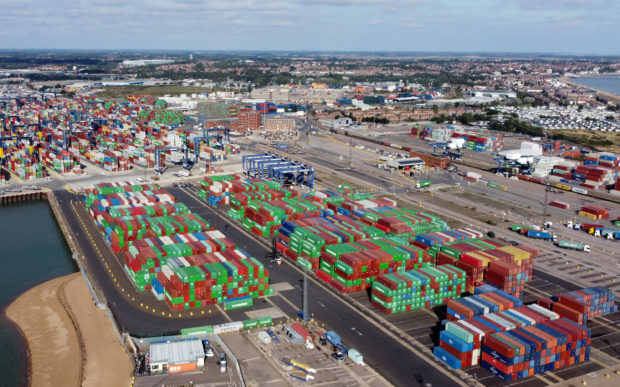Workers at UK’s biggest container port due to begin 8-day strike

A view shows stacked shipping containers at the port of Felixstowe, Britain1. Picture taken with a drone. REUTERS/Hannah McKay/File photo
LONDON -More than 1,900 workers at Britain’s biggest container port are due on Sunday to start eight days of strike action which their union and shipping companies warn could seriously affect trade and supply chains.
The staff at Felixstowe, on the east coast of England, are taking industrial action in a dispute over pay, becoming the latest workers to strike in Britain as unions demand higher wages for members facing a cost-of-living crisis.
“Strike action will cause huge disruption and will generate massive shockwaves throughout the UK’s supply chain, but this dispute is entirely of the company’s own making,” said Bobby Morton, the Unite union’s national officer for docks.
“It [the company] has had every opportunity make our members a fair offer but has chosen not to do so.”
On Friday, Felixstowe‘s operator Hutchison Ports said it believed its offer of a 7-percent pay rise and a lump sum of 500 pounds ($604) was fair. It said the port‘s workers union, which represents about 500 staff in supervisory, engineering and clerical roles, had accepted the deal.
Unite, which represents mainly dock workers, says the proposal is significantly below the current inflation rate, and followed a below inflation increase last year.
“The port regrets the impact this action will have on UK supply chains,” a Hutchison Ports spokesperson said.
The port said it would have a contingency plan in place, and was working to minimize disruption during the walkouts which will last until Aug. 29.
Shipping group Maersk, one of the world’s biggest container shippers, has warned the action would have a significant impact, causing operational delays and forcing it to make changes to its vessel line-up.
Figures released on Aug. 17 showed Britain’s consumer price inflation hit 10.1 percent in July, the highest since February 1982, and some economists forecast it will hit 15 percent in the first three months of next year amid surging energy and food costs.
The squeeze on household incomes has already led to strikes by the likes of rail and bus workers demanding higher pay rises.